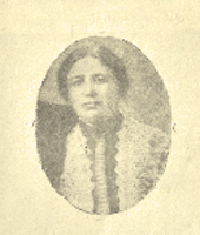
? – 1912
“The late Nino Kikodze – Sharashidze belonged to that group of female teachers who started their activity in the 1880s… She was born into a poor family of Ivane Nikolaishvili in the village of Nigoiti, in Guria.
“In the 1870s, Anna Muskhelashvili opened a free school for women in the old district of Akhaltsikhe, for local Georgian Catholics.
“Once Anna Muskhelashvili learned about the death of her good friend, Gerasime Kalandarishvili, she instantly invited Gerasime’s widow, the guardian of small Zhipo, to the school as a teacher. That is how Zhipo came to get in Anna’s school… She became the best student and a favorite of everyone. The desire and dream of Zhipo back then was to get to a secondary educational institution.
“Nino (Zhipo) Kikodze – Sharashidze was the first woman from Guria who obtained the secondary education. At that time, Zhipo dreamt of obtaining higher education and thereafter, working as a teacher. But lack of funds made it impossible to realize and Zhipo took up teaching outright…
“In her private letter, a former student of the late Nino (Zhipo) Kikodze – Sharashidze described her teacher as followa: ‘Zhipo was an exceptional person! Such person is especially valuable among Georgian women given the lack of initiative and the passivity which, unfortunately, is characteristic of Georgian women of our times.… Had she belonged to our generation, she would have definitely been a famous public figure. She possessed everything for this: open mind, serious character, proper training and especially generous heart’…”
Ganatleba magazine, issue #1; January, 1912
Past and Present of Women’s School in Ozurgeti
“Until 1885, the affair of the educations institution was not favorable both in terms of funding and quality of teachers. But once Ms. Kikodze became a teacher, in 1885 – 1888, everyone started becoming fond of learning owing to the good teacher and the things in the educational institution improved. The number of pupils increased manifold and we constructed the building of the educational institution ourselves.”
Kvali newspaper, issue #45; 1894

